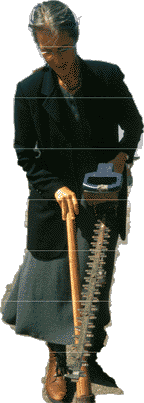 by Carol Denney; published August 2001
by Carol Denney; published August 2001 I sat not thirty feet from a child molester, a man well-known in our folk community who did not contest the charges against him in exchange for a swift, relatively quiet divorce from his wife of ten years. The little girl who was abused is slightly older now, but still a child.
When I saw him in the crowd, my stomach jolted, then slowly turned. I went through a brief period where I wondered if I would be able to stand or speak, let alone sing. It took me several minutes of effort, and by the time I could look at him I realized he was moving from acquaintance to acquaintance, trying to settle into the same circle he once frequented.
I believe in forgiveness, and forgave this man long ago realizing that his sexual predilection for children was more a disability than a deliberate act, or at least both. But that does not mean I am comfortable around him, nor am I convinced that his time served represents any kind of cure. His willingness to circulate in precisely the group of people whom he betrayed seemed to represent the opposite of any recognition of the sick horror it is simply to see him laughing and chatting normally, something the little girl he abused may never be fully able to do.
I wish him well. I also wish him well away from the circle of people whom he abused, and finally realized it was up to me to say so. I motioned him well away from the crowd and asked why he was there. "I have friends here," he said. I pointed out that he also had others in the crowd who were extremely uncomfortable around him to the point of illness or exit. He ticked off on his fingers the people he had managed to regain acquaintanceship with as though counting votes.
I tried to suggest that all these and more acquaintanceships could be refreshed or created in some new circle, where the likelihood of crossing paths with the principals central to the episode of abuse were not likely to travel, and that to do otherwise made it extremely hard on the very people whose trust he had abused, who were then obliged to alter their normal social interactions and avoid their normal patterns to avoid him.
It is common knowledge that one in five women experiences rape or sexual abuse, and that most men who rape or molest do so within their circles of friends and family. Either the abuser or the abused must move out of that circle, for it is the same group. It may be legal for a child molester to court the same circle, but it strikes me as absurd to require the victim to suffer the original trauma and then remove herself from her social circles, her church, her temple, her school, her musical gatherings, etc.
"Is there no redemption?" he responded. His response bewildered me at the time, but I think now I understand. This man is still more concerned about himself and his own community acceptance than taking the simple steps necessary to protect the people he abused from encounters with him. His original act was purely selfish, and the pattern, as I'm told is typical, continues. It is not asking much to ask him to see those friends and family who wish to continue acquaintance with him in more private settings.
I want no law requiring rapists and child molesters to avoid standing in supermarket lines behind their victims; this should be understood, and people who watch it happening should intervene, gently reminding impaired individuals that there may be no law but there is a moral obligation to make restitution to a community so severely stung by an act so inexcusable.
Others may speak about whether or not to "boycott" Pasand, owned by a man for whom sexual slavery and abuse was argued as "traditional". But there are many such as myself for whom eating at Pasand's is simply no longer an option because we would have no appetite, assuming we could even walk in the door.
I hope someday I can rely upon a community of people who recognize the necessity of some simple conventions regarding sexual abuse and the years of damage which follow. The listeners at the Freight would possibly have had a very different experience if they had known with whom they were sitting and the circumstances of his misconduct. I hope someday they will recognize that their own discomfort pales in comparison to that of his more immediate victims, and take the simple steps needed to protect others who are in incalculable pain.
Carol Denney is a musician and community activist.
Carol Denney MSL
1970 San Pablo Ave #4
Berkeley, Ca 94702
(510) 548-1512 cdenney@igc.org